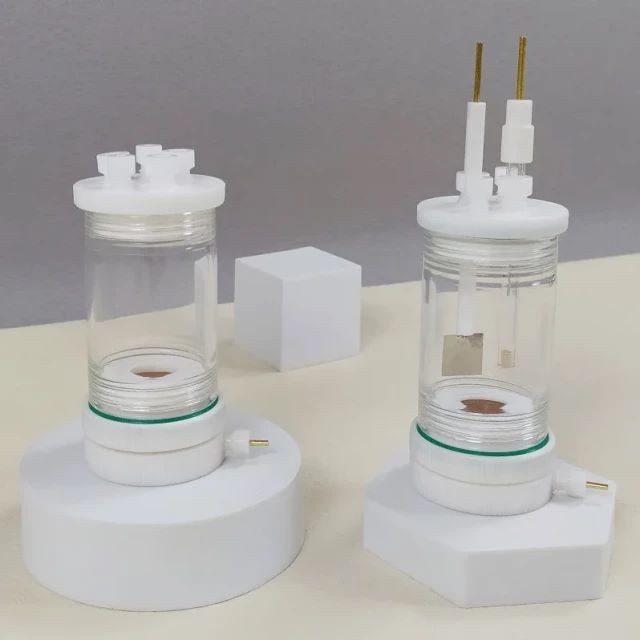
Electrochemical Consumables
Multifunctional Electrolytic Electrochemical Cell Water Bath Single Layer Double Layer
Item Number : ELCM
Price varies based on specs and customizations
$159.00 / set
- Specification
- 30ml ~ 1000ml
- Applicable temperature range
- 0 ~ 60℃
- Material
- Glass + PTFE
- Working conductive sheet material
- Copper / Titanium
Shipping:
Contact us to get shipping details Enjoy On-time Dispatch Guarantee.
Why Choose Us
Easy ordering process, quality products, and dedicated support for your business success.
Discover our selection of multifunctional 30ml ~1000ml electrolytic cell water baths, available in both single and double-layer options and designed with superior corrosion resistance.
Technical specifications
| Specification | 30ml ~ 1000ml |
| Applicable temperature range | 0 ~ 60℃ |
| Material | Glass + PTFE |
| Working conductive sheet material | Copper / Titanium |
Detail & Parts

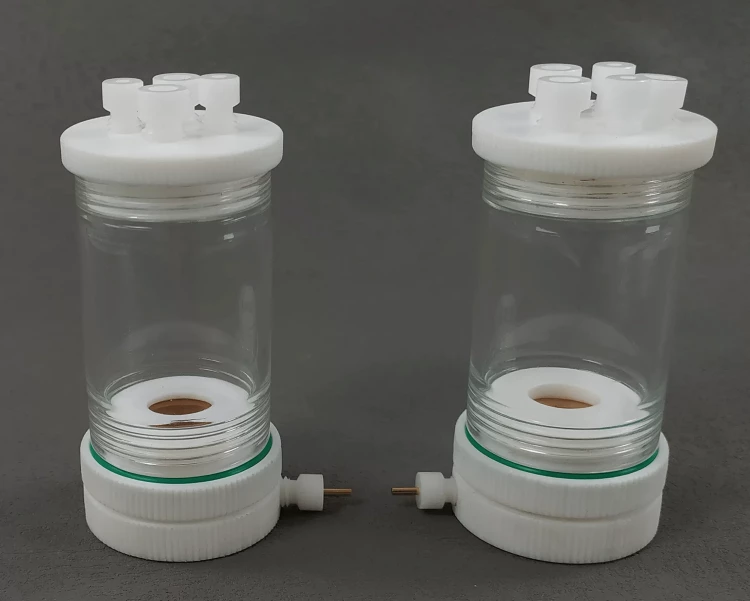




Operating steps

1. Our sealed electrolytic cell features a rubber sealing ring, plug, PTFE cover, and bottom body.

2. For installation, simply insert the electrode and gas pipe, then add the sealing ring.

3. Complete the setup by adding all sealing rings and fixing the electrode in place.

4. The three-electrode system electrolytic cell is installed
Designed for You
KinTek provide deep custom made service and equipment to worldwide customers, our specialized teamwork and rich experienced engineers are capable to undertake the custom tailoring hardware and software equipment requirements, and help our customer to build up the exclusive and personalized equipment and solution!
Would you please drop your ideas to us, our engineers are ready for you now!
Trusted by Industry Leaders

FAQ
What Are Electrolytic Cells Used For?
What Is The Function Of Auxiliary Electrode?
What Are The Materials Used In Electrochemical Cell?
What Is The Difference Between Galvanic Cell And Electrolytic Cell?
What Is The Difference Between Auxiliary And Reference Electrode?
What Are The Examples Of Electrochemical Material?
What Is An Electrolytic Cell And How Does It Work?
What Materials Are Commonly Used For Auxiliary Electrodes?
What Are The Two Points Of Difference Between Electrochemical And Electrolytic Cells?
How Do Auxiliary Electrodes Affect The Performance Of An Electrochemical Cell?
What Is The Example Of Electrolytic Cell?
Why Are Auxiliary Electrodes Necessary In Electrochemical Systems?
Are Electrolytic Cells Spontaneous?
Are There Any Limitations Or Considerations When Using Auxiliary Electrodes?
4.9 / 5
I was impressed by the quick and efficient delivery of the product. It arrived well-packaged and in perfect condition, ready to be put to use.
4.7 / 5
The electrolytic cell water bath is an excellent value for money. It's a well-made and durable piece of equipment that has exceeded my expectations.
4.8 / 5
The quality of the electrolytic cell water bath is top-notch. It's made from high-quality materials and is built to last. I'm confident that it will serve me well for many years to come.
4.6 / 5
The electrolytic cell water bath is a durable piece of equipment. It's well-constructed and can withstand the rigors of daily use in my laboratory.
4.9 / 5
I'm impressed by the technological advancement of the electrolytic cell water bath. It's a cutting-edge piece of equipment that allows me to conduct my experiments with greater precision and accuracy.
4.7 / 5
The electrolytic cell water bath is easy to use. It's well-designed and comes with clear instructions, making it easy to set up and operate.
4.8 / 5
I'm satisfied with the customer service provided by KINTEK SOLUTION. They were responsive to my inquiries and provided helpful support throughout the entire process.
4.6 / 5
The electrolytic cell water bath is a versatile piece of equipment. It can be used for a wide range of experiments, making it a valuable addition to my laboratory.
4.9 / 5
I'm impressed by the safety features of the electrolytic cell water bath. It has built-in safeguards to protect users from potential hazards, ensuring a safe and secure working environment.
4.7 / 5
The electrolytic cell water bath is energy-efficient. It consumes less power than other similar products, making it a cost-effective choice for my laboratory.
4.8 / 5
I'm happy with the overall performance of the electrolytic cell water bath. It meets all my expectations and has proven to be a valuable asset in my research work.
4.6 / 5
The electrolytic cell water bath is a reliable piece of equipment. It operates smoothly and consistently, providing accurate and reproducible results.
4.9 / 5
I'm pleased with the technical support provided by KINTEK SOLUTION. They are knowledgeable and responsive, ensuring that I can get the most out of the electrolytic cell water bath.
4.7 / 5
The electrolytic cell water bath is a well-maintained piece of equipment. It's regularly inspected and calibrated, ensuring its accuracy and reliability.
4.8 / 5
I highly recommend the electrolytic cell water bath from KINTEK SOLUTION. It's a top-quality product that has exceeded my expectations in every way.
REQUEST A QUOTE
Our professional team will reply to you within one business day. Please feel free to contact us!
Related Products
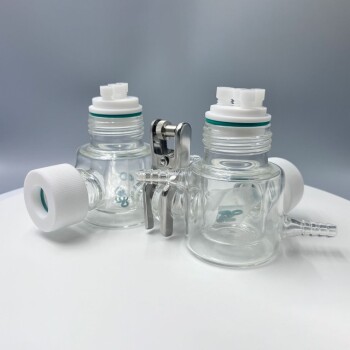
H-Type Double-Layer Optical Electrolytic Electrochemical Cell with Water Bath
Double-layer H-type optical water bath electrolytic cells, with excellent corrosion resistance and a wide range of specifications available. Customization options are also available.
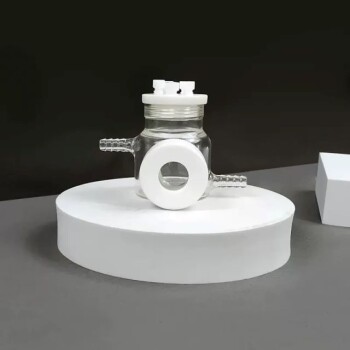
Optical Water Bath Electrolytic Electrochemical Cell
Upgrade your electrolytic experiments with our Optical Water Bath. With controllable temperature and excellent corrosion resistance, it's customizable for your specific needs. Discover our complete specifications today.

Electrolytic Electrochemical Cell for Coating Evaluation
Looking for corrosion-resistant coating evaluation electrolytic cells for electrochemical experiments? Our cells boast complete specifications, good sealing, high-quality materials, safety, and durability. Plus, they're easily customizable to meet your needs.
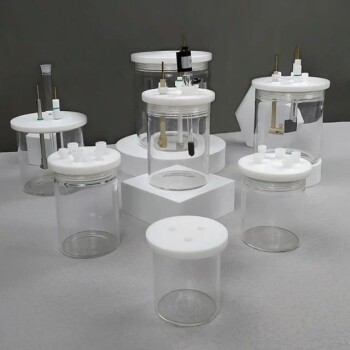
Electrolytic Electrochemical Cell with Five-Port
Streamline your laboratory consumables with Kintek's Electrolytic Cell with five-port design. Choose from sealed and non-sealed options with customizable electrodes. Order now.
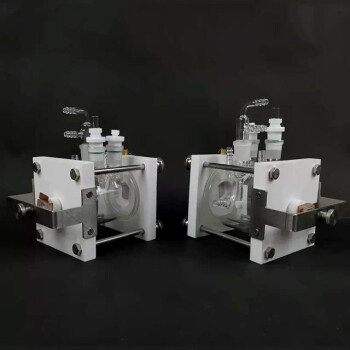
Flat Corrosion Electrolytic Electrochemical Cell
Discover our flat corrosion electrolytic cell for electrochemical experiments. With exceptional corrosion resistance and complete specifications, our cell guarantees optimal performance. Our high-quality materials and good sealing ensure a safe and durable product, and customization options are available.

Super Sealed Electrolytic Electrochemical Cell
Super-sealed electrolytic cell offers enhanced sealing capabilities, making it ideal for experiments that require high airtightness.

Electrolytic Electrochemical Cell Gas Diffusion Liquid Flow Reaction Cell
Looking for a high-quality gas diffusion electrolysis cell? Our liquid flow reaction cell boasts exceptional corrosion resistance and complete specifications, with customizable options available to suit your needs. Contact us today!

5L Chilling Circulator Cooling Water Bath Circulator for Low Temperature Constant Temperature Reaction Bath
Maximize lab efficiency with the KinTek KCP 5L Chilling Circulator. Versatile and reliable, it provides constant chilling power up to -120℃.
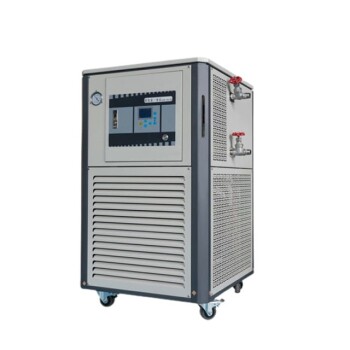
100L Heating Chilling Circulator Cooling Water Bath Circulator for High and Low Temperature Constant Temperature Reaction
Get all-in-one heating, chilling, and circulating capabilities with our KinTek KCBH 80L Heating Chilling Circulator. High efficiency, reliable performance for labs and industrial applications.

30L Heating Chilling Circulator Cooling Water Bath Circulator for High and Low Temperature Constant Temperature Reaction
Get versatile lab performance with KinTek KCBH 30L Heating Chilling Circulator. With max. heating temp of 200℃ and max. chilling temp of -80℃, it's perfect for industrial needs.
Related Articles

Exploring the Multifunctional Electrolytic Cell Water Bath: Applications and Benefits
Discover the versatile applications of multifunctional electrolytic cell water baths in various industries. Learn about their benefits, components, and how they facilitate chemical reactions and temperature control.

The Thermodynamic Paradox: Balancing Precision and Safety in Electrolytic Cells
Master temperature control in double-layer water-bath electrolytic cells. Understand material limitations, prevent thermal damage, and ensure data integrity.

Understanding Quartz Electrolytic Cells: Applications, Mechanisms, and Advantages
Explore the detailed workings, applications, and benefits of quartz electrolytic cells in various industries. Learn how these cells facilitate precise chemical reactions and their role in high-purity metal production.

Understanding Electrolytic Cells and Their Role in Copper Purification and Electroplating
Electrolytic cells play a crucial role in various industrial processes, including copper purification and electroplating. These cells utilize an external power source to drive chemical reactions, resulting in the decomposition of substances. Through the process of electrolysis, an electric current is passed through a liquid or solution containing ions, causing them to break down.

Advanced Electrolytic Cell Techniques for Cutting-Edge Lab Research
Electrolytic cells are devices that utilize an electric current to induce a non-spontaneous chemical reaction.

Applications of Electrolytic Cells in Purification and Electroplating
Electrolytic cells are chemical cells that use electricity to generate a non-spontaneous redox reaction. These cells are used in various electrochemical processes such as electrolysis and electroplating.

Understanding Flat Corrosion Electrolytic Cells: Applications, Mechanisms, and Prevention Techniques
Explore the detailed workings of flat corrosion electrolytic cells, their role in industrial processes, and effective strategies to mitigate corrosion. Learn about electrolytic cells, their components, and applications in electroplating and metal purification.

Advanced Techniques in Coating Evaluation Using Electrolytic Cells
Explore the comprehensive guide on coating evaluation using electrolytic cells, covering electroplating, sol-gel methods, and wet chemical techniques. Enhance your understanding of metal coating properties and applications.

Applications of H-Type Electrolytic Cell in Metal Extraction
H-type electrolytic cells uses an electrolyte solution to dissolve the metal ions and an electric current to separate the metal ions from the solution.

Understanding Electrodes and Electrochemical Cells
An electrode is a point where current enters and leaves the electrolyte. It is a conductor used to make a junction with a nonmetallic part of a circuit. Electrodes can be made of materials such as gold, platinum, carbon, graphite, or metal. They serve as the surface for oxidation-reduction reactions in electrochemical cells. There are different types of electrodes, including anode and cathode.

Electrolytes and Electrochemical Electrodes
Electrolytes and electrodes play an essential role in electrochemistry. Electrolytes are substances that conduct electricity when dissolved in water or melted.

Innovations in Electrochemical Electrodes Technology
Recent advancements in nanotechnology and materials science have led to significant improvements in electrochemical devices, making them more efficient, durable, and cost-effective.